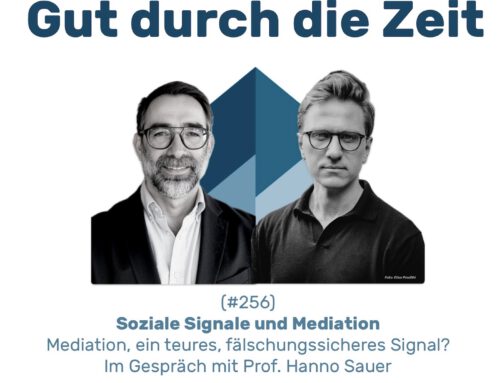INKOVEMA Podcast „Well through time“
#29 – Mediation and artificial intelligence.
When and how can artificial intelligence support media professionals in their work? In conversation with Dr Michael Bartl
Well through time. The podcast about mediation, conflict coaching and organisational consulting.
Dr Michael Bartl is managing director of the Emotion AI Startups TAWNY and Management Board of HYVE Group of companies for innovation in Munich. In conversation with Sascha Weigel, we explore the possibilities and framework conditions that Artificial intelligence as a support tool for mediation work to appear.
Contents:
- Ways and applications of artificial intelligence and emotion recognition
- Acquisition of basic biological data via technology – BiometricsImage (video camera), sound and voice (microphones)
- Challenges for the application:
- frightening associations with artificial intelligence (dark patterns, risks of misuse, etc.)
- Successful data protection of highly personal data
- Ethical technology (human centred algorithm)
- Support options
- Biometric pattern recognition to form and validate hypotheses. Second opinion in real timeinstead of in subsequent supervision and reflection (in co-mediation).
- Communicative pattern recognition of mediation discussions. Thesis: Overlooked patterns become visible.
- Improved education and training for mediators through AI-supported training formats.
- Improved preparatory work through smart research, e.g. in peace mediation (see also Höne, K.: Mediation and artificial intelligence: Notes on the future of international conflict resolution. Diplo Foundation 2019).
The best emotion recognition machine is still the human being.
Specialist literature:
- Larson, David A.: Artificial Intelligence. Robots, Avatars, and the Demise of the Human Mediator, Ohio State Journal on Dispute Resolution, Vol. 25/1, 2010).
Popular literature on artificial intelligence:
- O’Neil, Cathy: Attack of the algorithms. How they manipulate elections, destroy career opportunities and jeopardise our health, Frankfurt am Main 2018.
- Fry, Hannah: Hello World. What algorithms can do and how they are changing our lives, Munich 2019.
Left:
- Dr Michael Bartl's website: www.michaelbartl.com
- Website of the Munich-based start-up for emotion recognition: www.tawny.ai
- HYVE group of companies for innovation: www.hyve.net
further web applications for artificial intelligence and emotion recognition:
- Mental Health Chatbot: www.2xai.com
- Affective emotion recognition: www.affectiva.com





Leave A Comment